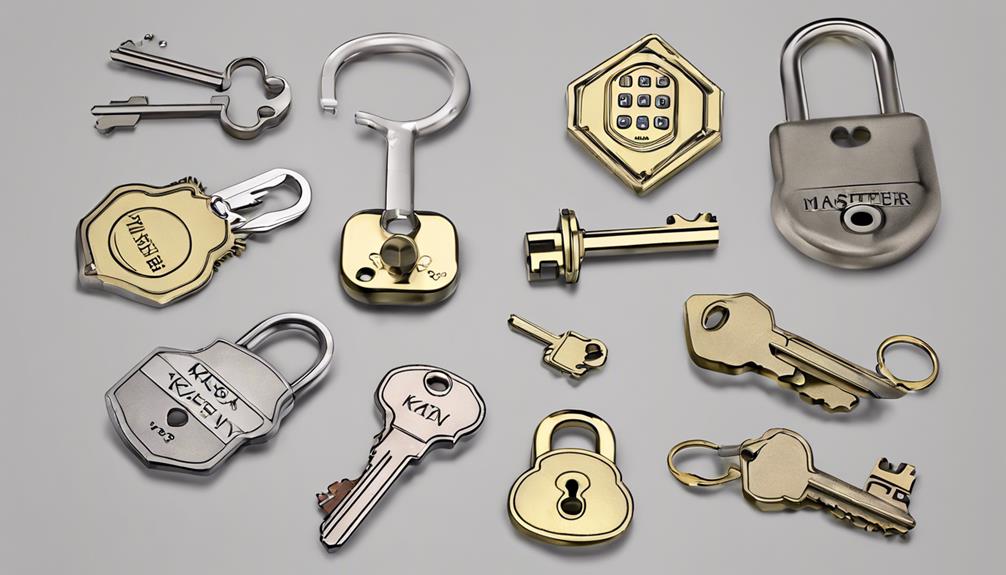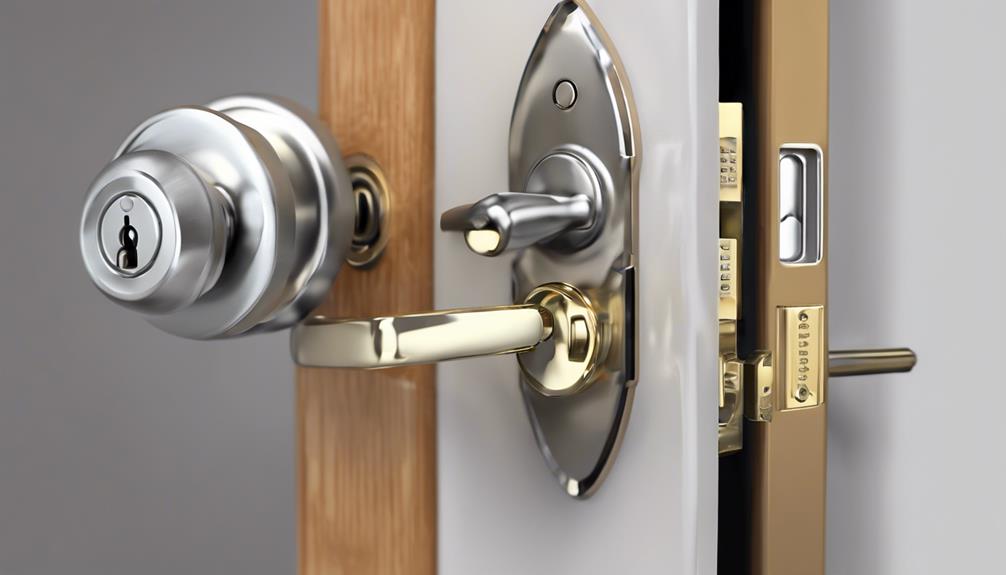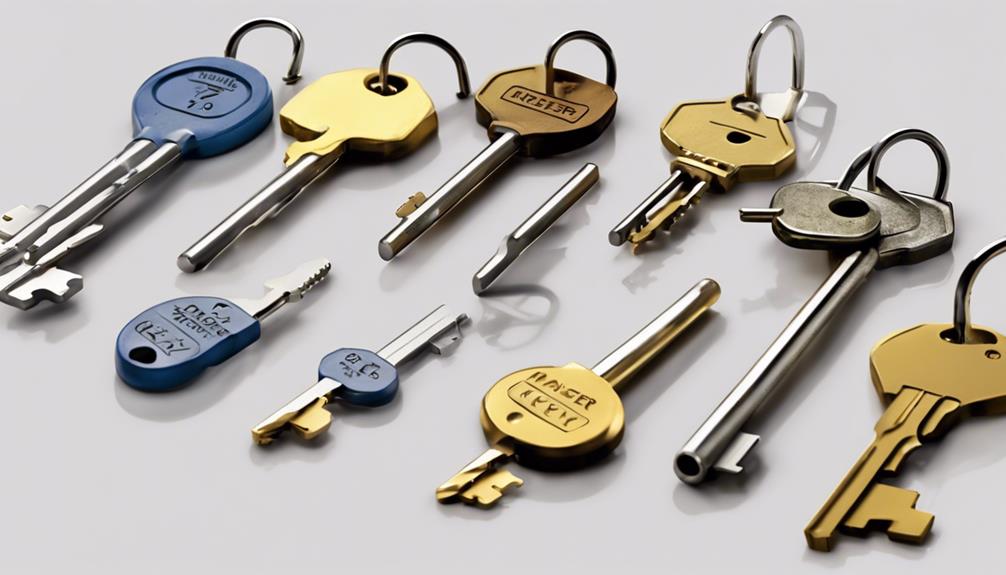Master keying is a system that allows one key to open multiple locks, providing various levels of access. During rekeying, master keying can be incorporated to establish a hierarchical access structure, enhancing control over permissions and reducing the risk of unauthorized entry. This process offers customized access solutions and minimizes the number of keys needed. If you're looking to learn more about how master keying works and its benefits for security and access management, exploring its integration during rekeying will provide valuable insights into establishing a thorough access control system.
Key Takeaways
- Master keying enables multiple keys to open different locks within a system.
- Incorporating master keying during rekeying enhances access control and security.
- Hierarchical access structure allows for customized access permissions.
- Seamless integration possible if the existing system supports master keying.
- Proper procedures and tools ensure successful addition of master keying during rekeying.
Definition of Master Keying

Master keying is a system that allows for multiple keys to open different locks while also having a master key that can open all of the locks within the system. This system is essential in key systems with varying security levels. Imagine this: you have a grand master key that opens every lock in the building, a sub-master key that can access multiple locks in a specific area, and individual keys that only work on one lock. It's like having a hierarchy of keys, where the master key reigns supreme, granting access to all, while the sub-master keys have their domains, and the individual keys have limited power. Master keying is the key to a secure and organized access control system.
Benefits of Multi-Tiered Access System
To understand the benefits of a multi-tiered access system, it is vital to recognize the advantages it offers regarding security and access control. This system provides a sophisticated level of access control, allowing you to segment areas within your premises based on user permissions. By implementing a multi-tiered access system, you enhance security management by restricting access to certain areas to authorized personnel only. This not only prevents unauthorized entry but also guarantees that sensitive areas remain protected. Additionally, this system allows for streamlined security protocols, making it easier to manage and monitor access rights. With its robust security features, a multi-tiered access system is a valuable tool for organizations looking to enhance their overall security posture.
Incorporating Master Keying During Rekeying

When rekeying a lock system, the process of incorporating master keying can offer enhanced control and flexibility over access permissions. This method allows for the creation of a hierarchical access structure where certain keys open specific locks while a master key can open all locks within a system. By implementing master keying systems, you can control access levels more effectively, minimizing the risk of unauthorized entry. This not only enhances security but also provides customized access control solutions tailored to your specific needs. Here are three key benefits of incorporating master keying during rekeying:
- Enhanced Security: By implementing master keying systems, you can control access levels more effectively, minimizing the risk of unauthorized entry.
- Convenience: With master keying, you can reduce the number of keys needed to access different areas, simplifying key management.
- Customization: Rekeying options can be tailored to suit your specific needs, providing a personalized security solution.
Can Master Keying Be Added Easily?
Incorporating master keying during the rekeying process enhances security and access control. Adding master keying to an existing system can be straightforward if the initial system was designed with master keying capabilities. Master keying systems allow for multiple levels of access, with a master key that can open all locks and individual keys that only work on specific locks. When implementing master keying, key control measures are essential to prevent unauthorized duplication and maintain system integrity. By following proper procedures and utilizing the right tools, master keying can be seamlessly integrated during the rekeying process. Remember, a well-designed master key system is the key to releasing enhanced security and convenience.
- Master key systems provide enhanced security and access control by allowing for multiple levels of access, as explained in a post on rekeying and security considerations.
- Adding master keying capabilities during the rekeying process guarantees a seamless integration of advanced security features.
Master Keying in Residential Properties

Master keying in residential properties offers homeowners an efficient and secure way to manage access control within their premises. When considering residential security and lock upgrades, master keying can provide the following benefits:
- Convenience: Easily access multiple areas with a single key, eliminating the need for a large keyring. This system operates by designating one key, known as the master key, that can open multiple locks within the property, providing seamless access control (Master Key Systems).
- Enhanced Security: Restrict access to certain areas while allowing entry to others, providing peace of mind.
- Flexibility: Easily rekey locks to accommodate changing access needs without replacing the entire lock, saving time and money.
Master keying not only simplifies access but also increases the overall security of your home, making it a valuable investment for residential properties.
Master Keying in Commercial Properties
For ideal security management in commercial settings, implementing a master keying system is vital. Commercial security relies heavily on controlling access to different areas within a building. With master keying, you can establish a hierarchical system where various levels of access are granted to different individuals or groups. This system allows for flexibility while maintaining a high level of security. In commercial properties, it is important to have control over who can access specific areas such as offices, storage rooms, or sensitive information spaces. Master keying provides the necessary access control to guarantee that only authorized personnel can enter designated zones. By incorporating master keying into your security strategy, you can effectively manage access rights and enhance overall security in commercial properties. Additionally, master keying is particularly beneficial in multi-unit properties where landlords have varying access needs for tenants.
Low Rate Locksmith's Nationwide Services

To effectively address security concerns across diverse locations, Low Rate Locksmith offers extensive nationwide locksmith services, including master key systems for enhanced access control. Trust Low Rate Locksmith to keep you safe and secure, no matter the location.
Conclusion
To summarize, mastering keying offers a seamless solution for simplifying security systems and streamlining access. By incorporating master keying during the rekeying process, you can easily create a multi-tiered access system with one master key operating all locks. Whether for residential or commercial properties, master keying provides added convenience and control. Consider implementing master keying with Low Rate Locksmith's nationwide services for a secure and efficient security solution.









